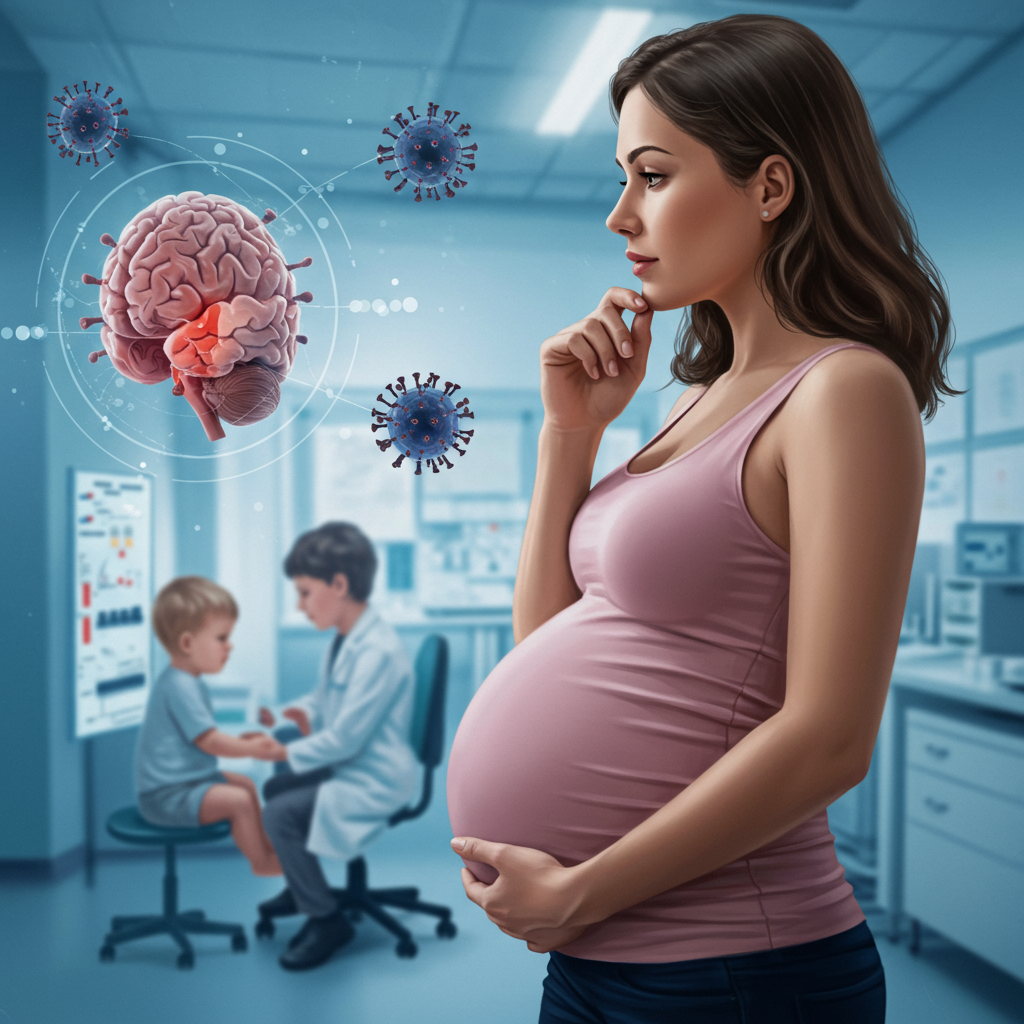A groundbreaking study from Massachusetts General Hospital suggests a significant link between mothers contracting COVID-19 during pregnancy and a heightened risk of their children being diagnosed with autism spectrum disorder (ASD) and other neurodevelopmental conditions. This comprehensive research, analyzing over 18,000 births, sheds new light on how prenatal exposure to the SARS-CoV-2 virus may impact developing fetal brains. The findings underscore the critical importance of preventing COVID-19 infection during pregnancy and advocating for early developmental support for children.
Unpacking the Landmark Study on Maternal COVID-19 Exposure
Researchers at Massachusetts General Hospital meticulously examined health records from over 18,000 live births. These births occurred within the Mass General Brigham health system between March 2020 and May 2021. The study specifically assessed mothers with laboratory-confirmed COVID-19 tests during pregnancy. Subsequently, it tracked neurodevelopmental diagnoses in their children up to age three.
The core finding is striking: children born to mothers who had COVID-19 during pregnancy were significantly more likely to receive a neurodevelopmental disorder (NDD) diagnosis. Specifically, 16.3% of children exposed to COVID-19 in utero were diagnosed with at least one NDD by age three. This contrasts with just 9.7% of children whose mothers did not have the infection. After adjusting for various risk factors, maternal COVID-19 during pregnancy was independently associated with a 29% increased risk of a child developing an NDD.
Autism and Other Neurodevelopmental Outcomes
The study delved deeper into specific diagnoses. It revealed a more than double increase in autism diagnoses among children whose mothers had COVID-19. Approximately 2.7% of children born to infected mothers received an autism diagnosis, compared to about 1.1% of those whose mothers were uninfected. Beyond autism, common diagnoses included speech and language delays, and motor function development disorders.
Certain groups appeared to face even higher risks. Boys showed a 43% higher risk of NDDs compared to girls. Furthermore, the timing of the infection played a crucial role. Risks were greatest when mothers contracted COVID-19 during the third trimester of pregnancy. Researchers highlight the third trimester as a “critical window for brain development,” making the fetal brain potentially more vulnerable during this period. The study authors also noted that 65% of maternal infections occurred in the third trimester.
Biological Plausibility and Study Context
The study’s results are considered “particularly notable in light of their biological plausibility.” Previous research has identified pathways through which a maternal COVID-19 infection could affect the developing fetal brain. This can happen even without direct viral transmission to the fetus. Maternal immune responses, often triggered by infections, are known to potentially disrupt fetal brain development. High fever, a common COVID-19 symptom, has also been previously linked to increased autism risk.
It’s important to note the study’s timeframe. It analyzed data from early in the pandemic, between March 2020 and May 2021. This period was before COVID-19 vaccines were widely available. Consequently, the researchers primarily studied an unvaccinated population. About 93% of the mothers in the assessment had not received any vaccine doses. This allowed them to isolate the association between SARS-CoV-2 infection and offspring neurodevelopment in a population not influenced by vaccination status.
Expert Perspectives and Parental Awareness
Dr. Lydia Shook, a maternal-fetal medicine specialist at Massachusetts General Hospital and lead author, stressed the importance of parental awareness. “Parental awareness of the potential for adverse child neurodevelopmental outcomes after COVID-19 in pregnancy is key,” she stated. She emphasized that understanding these risks empowers parents to “appropriately advocate for their children to have proper evaluation and support.”
Dr. Andrea Edlow, a senior author and maternal-fetal medicine specialist at Mass General Brigham, echoed this sentiment. She highlighted that “COVID-19, like many other infections in pregnancy, may pose risks not only to the mother, but to fetal brain development.” Her remarks underscore the vital importance of preventing COVID-19 infection during pregnancy. This advice is particularly relevant given the challenges to public trust in vaccines.
The Evolving Understanding of Autism
The findings emerge against a backdrop of increasing autism diagnoses in the United States. In 2022, approximately 1 in 31 children in the U.S. was diagnosed with autism by age 8. This is an increase from 1 in 36 children in 2020. Experts largely attribute this long-term trend to better understanding of the condition and improved screening methods. The U.S. Department of Health and Human Services recently launched a significant research effort to better understand the causes of autism. Autism is widely recognized as a complex syndrome influenced by a combination of genetic and environmental factors.
Important Caveats: Early Data and Ongoing Research
While the study provides critical insights, experts offer crucial caveats. Michael Osterholm, PhD, MPH, director of the Center for Infectious Disease Research and Policy (CIDRAP), cautioned that these findings, based on data from the pandemic’s early phase, might not fully apply today. He suggested that the observed neurodevelopmental risks could have been an “early phenomenon.” Similar to other immune-related clinical issues, risks might have significantly decreased over time. Osterholm advised that current pregnant individuals should not unduly worry, as the risks may have waned since the pandemic’s peak.
It is crucial to remember that this research, like many epidemiological studies, demonstrates a correlation, not necessarily direct causation. It calls for more extensive research into maternal COVID-19 cases. Long-term neurodevelopmental monitoring for children exposed to SARS-CoV-2 in utero is also recommended.
Beyond COVID-19: Addressing Misinformation in Pregnancy Health
The discussion around prenatal health has unfortunately been muddied by misinformation. Recent unproven claims have linked the common pain reliever acetaminophen (Tylenol) to autism in children. These claims have been strongly condemned by global medical experts and organizations. The American College of Obstetricians and Gynecologists (ACOG) explicitly disputes any direct causal link. Its president stated that such claims are “not backed by the full body of scientific evidence and dangerously simplifies the many and complex causes of neurologic challenges in children.” Kenvue, Tylenol’s manufacturer, also unequivocally states that “the science clearly shows that taking acetaminophen does not cause autism.”
While some studies have identified a positive link, others, including a large 2024 study of 2.4 million children, found no relationship. The U.S. Food and Drug Administration (FDA) advises doctors to consider limiting Tylenol use. However, it also emphasizes its importance as the safest over-the-counter option for treating fever and pain in pregnant women. Conditions like maternal fever can themselves harm both mother and fetus. Experts stress that there is “no robust evidence or convincing studies to suggest there is any causal relationship” between prudent acetaminophen use and autism. Such misinformation can pose health risks by discouraging safe and necessary treatments.
Preventing Infection and Promoting Healthy Development
The new study reinforces existing advice for pregnant individuals. Preventing COVID-19 infection during pregnancy is paramount. This includes adherence to public health recommendations, such as vaccination and practicing good hygiene. Vaccination remains a key preventive measure against severe COVID-19 outcomes and complications.
Parents and caregivers should remain vigilant about developmental milestones. Early evaluation and support for children showing signs of neurodevelopmental delays are crucial. By staying informed and working with healthcare providers, families can ensure the best possible outcomes for their children.
Frequently Asked Questions
What did the new study reveal about COVID-19 in pregnancy and autism risk?
A study from Massachusetts General Hospital found that children born to mothers who had COVID-19 during pregnancy were significantly more likely to be diagnosed with autism and other neurodevelopmental disorders (NDDs) by age three. Specifically, these children faced a 29% higher risk of NDDs, and the rate of autism diagnoses was more than double compared to children whose mothers were uninfected. Risks were higher for boys and when maternal infection occurred in the third trimester.
What preventive steps can pregnant individuals take regarding COVID-19?
Preventing COVID-19 infection during pregnancy is highly recommended. This includes following public health guidelines, practicing good hand hygiene, and considering vaccination against COVID-19. Experts emphasize the importance of prevention to protect both maternal and fetal health, especially given potential risks to fetal brain development highlighted by the study. Consulting with healthcare providers for personalized advice is always crucial.
Is acetaminophen (Tylenol) use during pregnancy linked to autism?
Despite some unproven claims, leading medical organizations like the American College of Obstetricians and Gynecologists (ACOG) and the FDA state there is no clear or robust scientific evidence proving a direct causal link between prudent acetaminophen use during pregnancy and autism. While some studies show correlations, others find no relationship. Experts confirm acetaminophen remains the safest over-the-counter option for managing fever and pain in pregnant women, as untreated fever can pose risks to maternal and fetal health.




